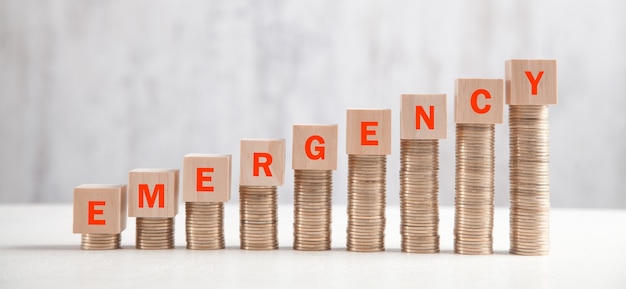Answers to the Biggest Questions about Your Emergency Fund
Save your money: this piece of financial advice is universal. It doesn’t matter who you ask, everyone knows that having an emergency fund is essential. What’s less obvious is how you build it or where to put it all. That’s where asking the right questions can come in handy. Below, you’ll find the answers to five important questions about your emergency fund.
1. How Much Should I Save?
A prevailing rule of thumb for emergency savings is to squirrel away enough to cover three to six months of living expenses.
But how much you need to feel safe in an emergency is subjective. It depends on a lot of factors, like your risk tolerance, support system, and the emergency itself.
2. What if an Emergency Arrives Before I’ve Saved Enough?
Emergencies don’t follow a strict schedule like your rent payments or utilities. They arrive sporadically throughout the year, usually when you’re least prepared to handle them.
If you don’t have adequate savings for an unexpected emergency repair or medical expense, you might need to borrow money. There are personal loans like an online installment loan or line of credit that can be your safety net when your savings fall short.
3. Should I Save or Pay off Debt?
It can be challenging to juggle both of these goals simultaneously. If you’re on a tight budget, you might have to choose one or the other.
In that case, it’s essential you make any minimum payment on installment loans and line of credit personal loans. This will protect you from late fines, extra interest charges, and potential damage to your credit.
If you have any leftover cash, put it toward a small emergency fund, aiming for something like $1,000 rather than the usual six months of expenses. Savings win over debt here because it’ll help you avoid adding to your debt.
Once you feel secure, start using your expendable cash on debt payments. Choose between the avalanche and snowball methods to find out which debt you should target first.

4. What Can I Use it On?
Use your emergency fund on unpredictable, essential expenses that you didn’t think to include in your budget. Think medical expenses not covered by insurance or auto or household repairs that you can’t ignore.
If you still aren’t sure, it’s helpful treating your fund like it’s an installment loan.
- Necessity: Due to their cost, you would only ever take out an installment loan online if you couldn’t wait to pay a bill or repair. Installment loans are designed to help with unavoidable, unexpected emergencies that you can’t delay. So is your emergency fund.
- Repayment: An essential part of the borrowing process is paying back your installment loan. The same goes for your emergency fund. You should pay back whatever you take so that you’re prepared for the next unexpected expense.
5. Am I Making the Most out of My Savings?
Consider where you keep your emergency fund. A stack of cash under the mattress isn’t just old-fashioned. It’s also not using your money to its full potential because you won’t earn interest on this cash.
Interest is a two-way street. It’s something you pay whenever you borrow money, but it’s something you earn when you save it.
Shop around for savings accounts with a high interest rate without penalizing you for taking out your money out of the blue.
Did this answer your most burning questions about saving? If not, keep asking until you build out savings that can handle any emergency.
